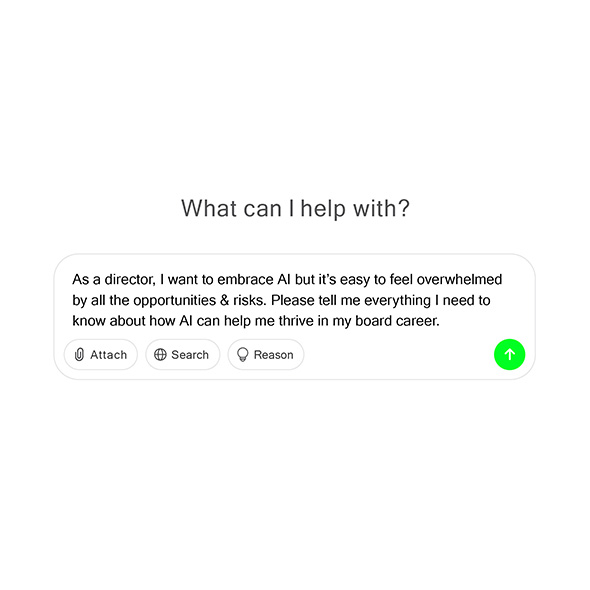How can AI safely play a bigger role in our boardroom?
Earlier this year, I facilitated a roundtable conversation with senior executives in The Hague. The brief was simple, but deliberately provocative: If AI were sitting at this table, what role would it play?
The discussion was about what’s possible when we combine the strengths of AI with the ethics, experience and judgement of people, especially those guiding strategy, culture and leadership.
Importantly, we must prepare. AI is already reshaping how we work and live. For boardrooms, this is no longer optional. Boards don’t need to be technical experts, but we need a clear grasp of the opportunities, limitations and risks. The decisions we make will shape whether AI becomes a tool for strategic advantage or a source of blind risk.
Considered, human-centric approach
AI has huge potential in the boardroom. It can enhance scenario planning, elevate strategic foresight, strengthen risk monitoring, improve compliance and provide real-time analysis that would take humans days or weeks to generate. It can serve as the voice of the brand, the investor, the underrepresented stakeholder or the customer — bringing perspectives into the room that might otherwise go unheard.
However, AI isn’t magic, nor is it neutral. Systems are only as effective as the data on which they’re trained, and without careful design, oversight and ethical guardrails, they can reinforce bias, introduce risk and create false confidence.
That’s why responsible AI adoption in the boardroom starts with the mindset: AI should augment human decision-making, not replace it. Boards are uniquely positioned to ensure this happens by bringing strategic clarity, ethical oversight and a long-term view to how AI is integrated into the organisation.
Five ways boards can start today
1. Clarify your purpose and risk appetite
Understand how AI could impact your strategy, workforce and stakeholders. Then define responsible use for your organisation. Align AI use with your risk appetite and strategic goals, and be ready to revisit them as AI capabilities develop.
2. Prioritise director education
Boards don’t need to code, but they do need AI literacy. Directors should understand what AI can and can’t do, the risks it introduces and how to ask the right questions. The AICD’s Eight elements of effective, safe and responsible AI governance is a strong starting point.
3. Establish appropriate oversight structures
AI is not set-and-forget. Establish policies and processes to monitor AI systems — auditing for bias, reviewing unintended consequences and ensuring systems stay aligned with organisational values.
4. Embed ethics into the conversation
Make space to discuss fairness, transparency and stakeholder impact. AI can simulate stakeholder sentiment or challenge assumptions, but boards must be alert to ethical blind spots.
5. Maintain human accountability
No matter how advanced the AI, final decisions must rest with directors. Human judgement, context and values should remain at the centre of governance and strategic decision-making.
Bridging the fear and opportunity gap
It’s understandable some directors feel discomfort or uncertainty about AI, particularly given the pace of change and the lack of clarity around regulation. But leaning away from AI won’t make the risks go away. What will help is adopting a measured, ethical and human-centric approach to AI.
It should be on your board agenda now. Done well, AI can support good governance and be a tool for deeper foresight, sharper strategy and faster adaptation. The boardroom is not the place to experiment blindly with AI, but with the right foundations, it can help directors lead with greater insight, agility and confidence in an increasingly complex environment.
Zora Artis GAICD is an experienced non-executive director, alignment and communication strategist and leadership coach. She is CEO of Artis Advisory, a partner at Mirror Mirror Alignment, co-founder of The Alignment People and a research fellow with Team Flow Institute.
This article first appeared under the headline 'The Fix' in the July 2025 issue of Company Director magazine.
Latest news
Already a member?
Login to view this content



